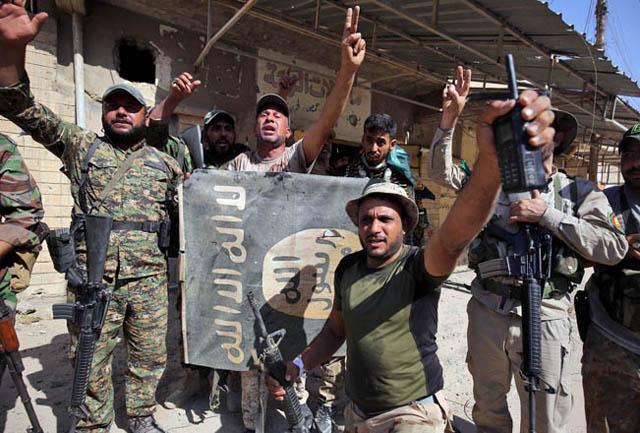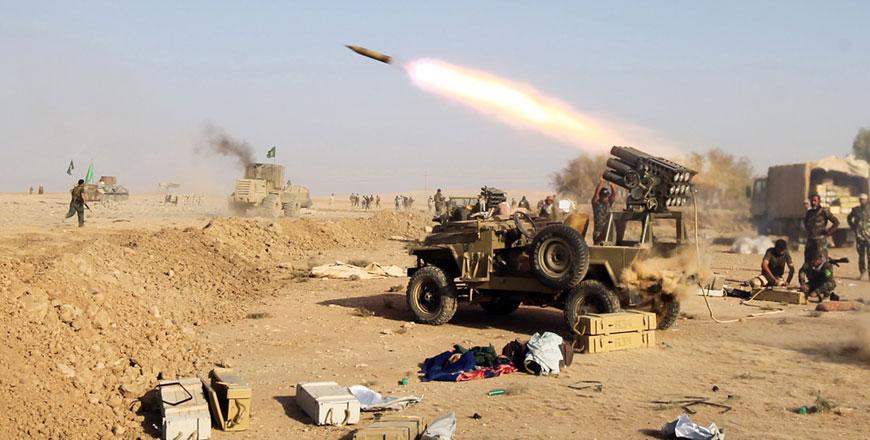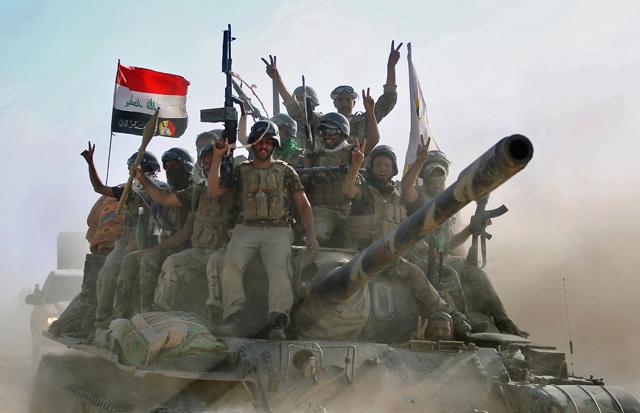You are here
Iraqi forces cut off Daesh-held Mosul from Syria
By AFP - Nov 23,2016 - Last updated at Nov 23,2016

Displaced Iraqi families who fled Mosul due to the ongoing fighting between Iraqi forces and Daesh militants wait to be taken to a camp for displaced people on Tuesday in Bartalla, east of Mosul (AFP photo)
MOSUL, Iraq — Forces battling the Daesh terror group in northern Iraq cut off the extremists' last supply line from Mosul to Syria Wednesday, trapping them in the city for a bloody last stand.
A day after the last major bridge over the Tigris in Mosul was bombed by the US-led coalition against Daesh, elite forces fighting in the east of the city also reported significant progress.
To the west of Mosul, Hashed Al Shaabi (Popular Mobilisation) paramilitary forces made a push to cut the road between two towns on the route heading to Syria, security officials said.
"Hashed forces have cut off the Tal Afar-Sinjar road," senior Hashed commander Abu Mahdi Al Mohandis said on social media.
A Kurdish security official told AFP that Hashed forces had linked up with other anti-Daesh forces, including Kurdistan Workers' Party (PKK) fighters, in three villages in the area.
The town of Tal Afar itself, which lies about 50 kilometres west of Mosul, is still under the control of the extremists.
Iraqi forces launched a major offensive on October 17 to retake Mosul, which is the country’s second city and where terrorist supremo Abu Bakr Al Baghdadi proclaimed a “caliphate” in 2014.
Federal forces have already entered the city from the east. Kurdish peshmerga and other forces are also closing in from the north and south, while only the west had remained open.
The latest development will make it very long and dangerous for Daesh if it attempts to move fighters and equipment between Mosul and the Syrian city of Raqqa, the last two bastions of their crumbling “state”.
A US-backed Kurdish-Arab alliance launched an offensive against Raqqa on November 5 but its fighters have some way to go before reaching the city.
In Iraq, almost two and a half years after IS took over swathes of the country, forces backed by the US and other partners have regained much ground.
Mosul is the last major prize in Iraq for the diverse and sometimes rival forces involved in the anti-Daesh effort, but the militants have offered stiffer resistance than elsewhere.
The eastern side of the city was expected to offer less resistance than the west bank but elite forces from the Counter-Terrorism Service (CTS) have faced a torrid time.
Daesh fighters moving in an intricate network of tunnels have used snipers, booby traps and a seemingly endless supply of suicide car bombers to stop Iraqi forces.
The authorities have not released casualty figures since the start of the offensive but fighters have admitted being surprised by how fierce Daesh resistance has been.
CTS’s Staff Lieutenant General Abdelghani Al Assadi said however that his forces had found fresh momentum in recent days.
“We cleared more than 40 per cent on the eastern side,” he told AFP, adding that after retaking the neighbourhood of Aden, CTS fighters had reclaimed parts of Al Zuhur.
“The task has become much easier for us — militant resistance has weakened,” he said. “Even if we face serious resistance, we’re going to eliminate them.”
On Tuesday, the US-led coalition that has carried out thousands of air strikes against Daesh targets in Iraq and Syria since August 2014 said it destroyed a key bridge in Mosul.
The last bridge still standing in Mosul is from the British era and not big enough for heavy vehicles to move across the Tigris, which runs through the middle of the city.
The intensity of the fighting has been one of the factors preventing civilians from fleeing to the safety of some of the camps being set up around Mosul.
The United Nations had expected around 200,000 people to flee their homes in the first few weeks of the offensive, but only about a third of that number had been displaced by Wednesday.
Forces have so far encouraged residents to remain in their homes as they inched through the city, fighting house-to-house.
Evacuating the population would allow Iraqi forces to use heavier artillery and achieve faster results but Iraq’s leadership wants to prevent the complete destruction of Mosul.
Related Articles
TAL AFAR, Iraq —Iraqi forces announced Saturday the ouster of the Daesh terrorist group militants from central Tal Afar and its historic cit
QAYYARAH, Iraq — Iraqi forces said Sunday that they recaptured a series of villages surrounding militant-held Mosul as the operation to reta
TAL ABTA, Iraq — Iraqi forces on Tuesday recaptured from the Daesh terror group the first three districts of extremist bastion Tal Afar as t














